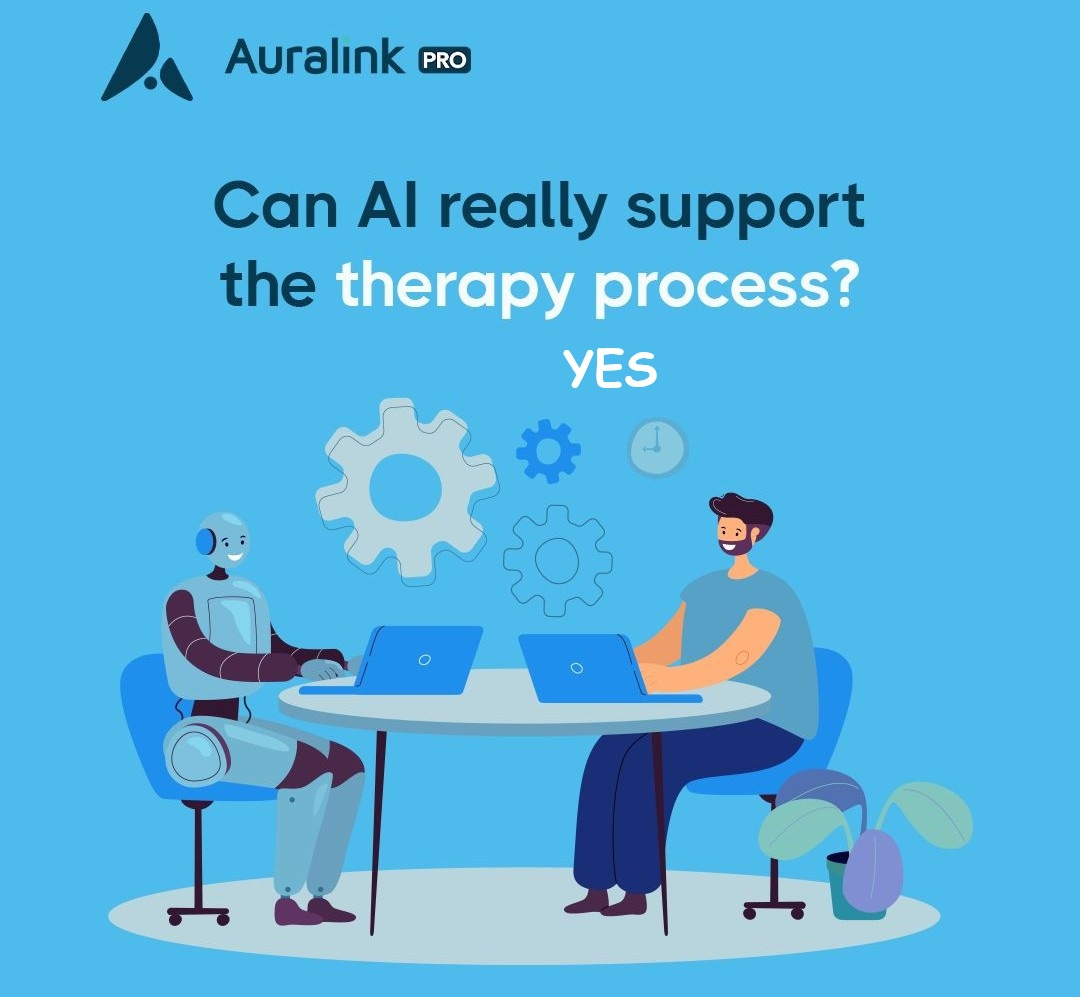The integration of artificial intelligence into psychotherapy is no longer a distant concept, it is actively shaping how clinicians approach assessment, reflection, and session preparation. Among the emerging tools designed specifically for the therapeutic process, Auralink Pro stands out as an AI Copilot for Therapists, built not for administrative convenience but to enhance the clinical experience itself. Leveraging AI-guided discovery and AI-powered mediation, Auralink Pro enables therapists to start sessions with clarity, depth, and actionable insight. Its asynchronous platform, featuring the AI mediator Ava, helps clients reflect on emotions and underlying issues privately, setting the stage for more focused and productive therapy.
In this article, we examine how AI tools like Auralink Pro are reshaping clinical practice, the mechanisms behind guided reflection, and the ways therapists can leverage technology to gain deeper insight into client dynamics without compromising therapeutic integrity.
The Role of AI in Modern Psychotherapy
Artificial intelligence in psychotherapy has often been framed around efficiency—session transcription, note-taking, and summarization. While these functions are helpful, they do little to enhance the therapeutic process itself. Clinical practice demands insight into client emotions, relational patterns, and behavioral trends, elements that cannot be reduced to administrative data alone.
Emerging AI tools now aim to support the therapeutic journey rather than replace human expertise. By offering structured reflection, pattern recognition, and guided mediation, these platforms allow therapists to understand clients more holistically. This represents a shift from reactive therapy, where insights emerge in-session, to a proactive model, where pre-session preparation informs intervention strategies and facilitates meaningful progress from the outset.
Structured Reflection Between Sessions
One of the most significant innovations in AI-assisted therapy is the concept of asynchronous guided reflection. This method allows clients to process emotions, articulate thoughts, and explore issues outside the confines of a live session. Structured reflection provides several key advantages:
- Enhanced Psychological Safety:Clients share openly without the pressure of immediate confrontation or judgment.
- Emotional Clarity:Pre-session reflection helps clients organize their thoughts, recognize recurring emotional patterns, and prepare questions or topics for discussion.
- Accelerated Breakthroughs:By surfacing key concerns early, therapists can focus on addressing core issues efficiently, avoiding time spent decoding surface-level behaviors.
Platforms such as Auralink Pro incorporate these principles using its AI mediator, Ava. Clients engage privately with Ava, unpacking their emotions and thoughts asynchronously. This preparatory step enables therapists to enter sessions with a nuanced understanding of client priorities and emotional landscapes, transforming session time into an opportunity for targeted intervention rather than exploratory decoding.
Leveraging AI for Insight and Pattern Recognition
Beyond facilitating reflection, AI can help therapists identify emotional patterns, attachment cycles, and alignment shifts over time. For example, longitudinal tracking of client inputs can reveal:
- Recurrent sources of relational tension
- Emotional triggers that are consistently misinterpreted or avoided
- Shifts in attachment behavior and interpersonal alignment
Auralink Pro’s Perspective 360 feature distills each client’s viewpoint into actionable insights. Unlike simple summaries, this system provides structured, clinically relevant observations that reduce emotional distortion and enable therapists to anticipate challenges. Accessing these insights before the session begins allows for pre-emptive planning and informed intervention, elevating both the efficacy and efficiency of therapy.
Enhancing Clinical Depth Without Compromising Practice
A critical concern among psychotherapists is that AI tools might intrude upon the therapeutic alliance. However, properly designed systems support rather than replace the therapist’s role. By using an AI Copilot for Therapists to handle reflection, pattern recognition, and preliminary analysis, clinicians can focus on clinical judgment, interpretation, and relational responsiveness—elements that AI cannot replicate.
For instance, in couples therapy, asynchronous reflection with Ava enables each partner to articulate emotions privately. This reduces in-session tension and posturing, allowing the therapist to address issues constructively rather than mediating conflict. Similarly, solo reflection modes enhance individual therapy by surfacing deeper self-awareness without dictating the therapist’s approach.
The net result is more productive sessions. Therapists spend less time interpreting, decoding, or navigating misunderstandings, and more time focusing on therapeutic strategies that directly advance client goals.
Workflow Integration and Smart Practice Advantages
AI copilots are designed for seamless integration into clinical workflows. They require minimal setup, and both therapists and clients experience a low learning curve, which is crucial in active practice settings. The platform includes a therapist insight dashboard, where pre-session summaries highlight patterns, emotional shifts, and clinical priorities.
Some practical advantages of integrating AI-guided tools into practice include:
- Deeper Pre-Session Insight:Therapists can identify potential challenges and opportunities before the client arrives.
- Increased Retention and Momentum:Clients feel heard and validated, fostering engagement and trust.
- Reduced In-Session Decoding:Less time is spent untangling miscommunication, allowing therapy to advance at a faster pace.
- Expanded Clinical Capacity:By offloading reflective and organizational tasks to AI, therapists can focus on high-value interventions.
These factors collectively contribute to the concept of a “smart practice,” where AI is leveraged to enhance clinical effectiveness rather than replace human expertise.
Security, Compliance, and Ethical Considerations
For psychotherapists, privacy and ethical responsibility are paramount. AI platforms must maintain strict adherence to HIPAA and data protection standards. Features such as end-to-end encryption, strict access controls, and zero data retention ensure that client data is secure. Importantly, session data is never used to train AI models, preserving confidentiality and ethical integrity.
Auralink Pro integrates these protections into its design, allowing therapists to confidently incorporate AI into practice without compromising client trust.
Clinical Applications and Measurable Outcomes
Therapists can apply AI-guided insights across a range of modalities:
- Individual Therapy:Enhances self-awareness and surfaces emotional patterns for targeted intervention.
- Couples Mediation:Facilitates communication and reduces in-session tension by enabling private, structured expression.
- Longitudinal Monitoring:Tracks sentiment, clarity, and alignment over time, providing measurable outcomes that inform ongoing treatment planning.
By leveraging structured AI reflection, therapists gain a 360-degree view of client dynamics—a capability that extends beyond what traditional session notes or post-hoc summarization can achieve. This approach allows therapists to measure and enhance therapy efficacy, ultimately leading to better client outcomes.
Integrating Auralink Pro in Practice
When considering the adoption of AI copilots, therapists benefit most from systems designed specifically for the therapeutic process. Auralink Pro, for example, is built to elevate clinical practice, not merely streamline administration. The platform enables therapists to:
- Prepare for sessions with actionable insight
- Leverage AI-guided mediation for private client reflection
- Access structured analysis of emotional patterns and relational dynamics
- Focus on high-value clinical interventions rather than administrative tasks
The structured integration of an AI Copilot for Therapists into pre-session reflection and post-session analysis represents a significant evolution in clinical practice, providing both therapists and clients with measurable advantages.
Future Directions in AI-Assisted Therapy
The integration of AI into psychotherapy is still evolving. Future directions may include:
- Enhanced pattern recognition for multi-modal behavioral data
- Predictive analytics for anticipating client challenges
- Adaptive intervention suggestions based on client reflection and emotional trends
However, the guiding principle remains the same: AI should support, not replace, the therapeutic process, preserving the human expertise, empathy, and judgment that are central to effective therapy. Tools like Auralink Pro exemplify this principle, providing therapists with deeper insight, more productive sessions, and enhanced client outcomes.
Conclusion
Artificial intelligence is increasingly becoming a partner in clinical practice rather than a mere administrative aid. Auralink Pro exemplifies this new class of AI Copilot for Therapists. Built specifically for the therapeutic process, it allows clinicians to start sessions with clarity, depth, and actionable insight, supporting structured reflection, emotional pattern recognition, and effective mediation.
For psychotherapists, integrating AI in a thoughtful and clinically informed way can lead to more focused sessions, faster breakthroughs, and stronger client engagement. Ultimately, leveraging AI in practice is not about replacing clinical judgment—it is about elevating the therapeutic experience for both therapists and clients.





























